1 of 13
Downloaded 15 times
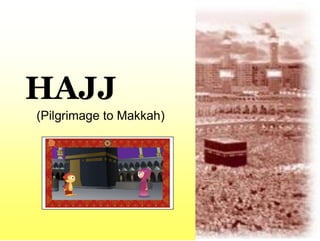
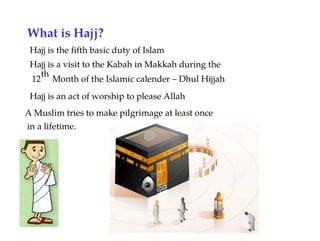
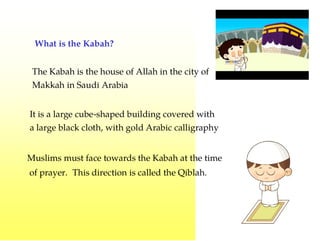

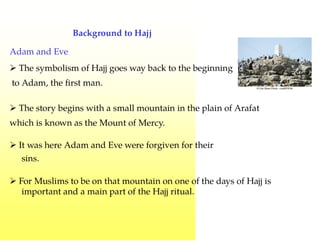
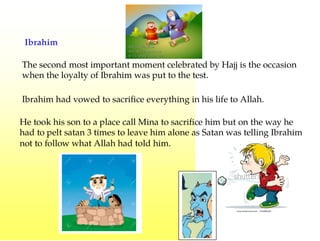
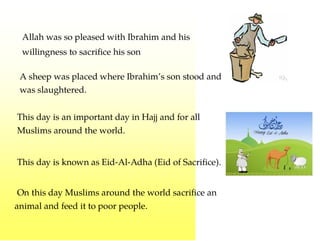
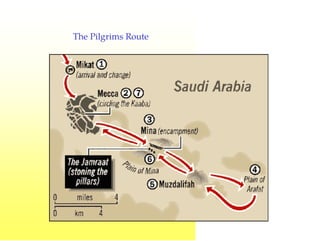



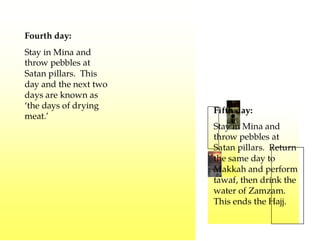
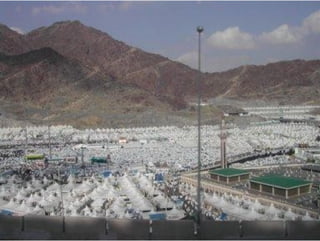
Ad
Recommended
90 Surah Balad Tafseer Midi
90 Surah Balad Tafseer MidiAyah Moonfruit
╠²
This surah was revealed in Makkah and discusses the true position of humans in the world. It explains that this world is a test of hardship, not a place of rest, and that Allah has shown humanity the paths of good and evil. While Allah has provided means of knowledge and understanding, most people find it easier to do evil instead of good. The surah swears by Makkah and all of humanity, and notes that while people seek wealth and think themselves unobserved, Allah has granted them senses to perceive guidance. It describes taking on the difficult task of doing good deeds like freeing slaves, feeding the hungry, and helping orphans as climbing the steep and difficult path that leads to Allah's mercy.Surah quraish
Surah quraishMohammad Yunus, MD, FACP
╠²
The document provides background information on Surah Quraish, including its meaning, message, and context. It discusses the Quraish tribe's history and importance in Makkah as custodians of the Kaaba. It summarizes that the surah asks the Quraish, who benefited greatly from their role in Makkah, to worship Allah alone as the true source of their security and prosperity.Dua book
Dua book suistic
╠²
This document is a guide on the importance and merits of du'a (supplication) in Islam, outlining various etiquettes and specific prayers for different occasions. It emphasizes the worship aspect of du'a and provides a comprehensive list of recommended supplications for times such as morning, evening, before sleeping, and during significant events. The document also includes teachings from the Prophet Muhammad on the appropriate times and manners for making du'a.Surah feel
Surah feelMohammad Yunus, MD, FACP
╠²
The document summarizes the story behind Surah Al-Fil (The Elephant), which refers to an event when Abraha's army of elephants, who were sent to destroy the Ka'bah in Mecca, were miraculously defeated by swarms of birds that pelted them with stones. Abdul Muttalib, the leader of the Quraysh tribe, refused to fight Abraha directly but trusted that God would protect His sacred house. God subsequently sent flocks of birds carrying stones that destroyed Abraha's army, thwarting their plan to conquer Arabia and intimidate its people. The story reinforced that God alone protected the Ka'bah and should be the sole object of worship.Events of prophets (Hz. Adam to Hz.. Essa) Described in Sequence - part I
Events of prophets (Hz. Adam to Hz.. Essa) Described in Sequence - part IMuhammad Husnain Afzal
╠²
The document outlines the chronological events of several prophets from Hz. Adam to Hz. Musa, detailing their lives, challenges, and the rise of idol worship among their communities. Key figures such as Hz. Ibrahim and Hz. Yusuf are highlighted for their struggles against tyranny and societal disbelief, and the miracles associated with them. The narrative illustrates the continuous cycle of prophetic guidance amidst the emergence of false idols and spurious beliefs through different generations.99 Questions Answers On The Seerah Of The Prophet Muhammad (Sallal Laahu Al...
99 Questions Answers On The Seerah Of The Prophet Muhammad (Sallal Laahu Al...Tracy Drey
╠²
This document contains 99 questions and answers about the seerah (biography) of the Prophet Muhammad (peace be upon him). It provides details about his birthplace, family members, wives, children, the beginning of his prophethood, the early spread of Islam, and important events like the Isra and Mi'raj and the Hijrah migration to Madinah. The questions cover topics like his name, lineage, work, marriage to Khadijah, treatment under the boycott, and the first Muslims to accept Islam.Your Kids and Hajj
Your Kids and HajjOnIslam
╠²
This document provides guidance for parents on how to explain and teach their children about Hajj, the fifth pillar of Islam. It includes practical tips, resources, and educational activities to help children understand the significance, rituals, and experiences associated with Hajj. The aim is to ensure that children grasp the spiritual aspects of the pilgrimage and can participate meaningfully in the tradition.May 2 isra miraj (1)
May 2 isra miraj (1)AYSHA NADA
╠²
The document summarizes key events and teachings from the Prophet Muhammad's night journey (Isra) and ascension to heaven (Mi'raj). It describes him encountering past prophets including Adam, Jesus, Moses and Abraham. He witnessed heavens, hell, angels and was given instructions on salah. The journey strengthened his faith and ability to convey Allah's message. Muslims are encouraged to commemorate it through good deeds and worship, not celebrations.Prophet Yusuf (a.s.)
Prophet Yusuf (a.s.)ftjaffer
╠²
1) Prophet Yaqub had 12 sons but was fondest of his youngest, Yusuf, who had a dream that his brothers would bow down to him.
2) Jealous of Yusuf, his brothers conspired to get rid of him by throwing him into a well and telling their father he was eaten by a wolf.
3) Yusuf was rescued from the well and sold as a slave to the king of Egypt. He rose to a high position by correctly interpreting the king's dreams but was later imprisoned due to the schemes of the king's wife.Hereafter
HereafterShariful Islam
╠²
The document discusses the Day of Judgment in Islamic belief, highlighting significant events like the Mahdee's emergence and the resurrection of souls. It details the contrasting fates of believers and non-believers in the afterlife, including the nature of their souls' departures, the conditions in the grave, and the final judgment. Key Quranic verses and Hadith are referenced to illustrate the themes of accountability, intercession, and the ultimate destinations of paradise and hell.Prophet Musa, Part 2 of 6
Prophet Musa, Part 2 of 6MuQeet
╠²
- Musa is now a young man living in Egypt who helps the weak and fights injustice. One day, during a fight between an Israelite and a Copt, Musa accidentally kills the Copt. He feels regret and asks Allah for forgiveness.
- When the Copts learn of this, they seek the killer. The Israelite reveals it was Musa to save himself, and word reaches Pharaoh who seeks to kill Musa. A man warns Musa to flee, so he escapes to Midyan.
- In Midyan, Musa helps some girls draw water. Impressed, their father offers Musa hospitality and marries one of his daughters to Musa after he agrees to work for 10Surah Al-Sharh (Inshirah)
Surah Al-Sharh (Inshirah)BananMahmaljyObeid
╠²
Surah Al-Sharh was revealed to support the Prophet Muhammad during times of emotional distress, particularly in response to public mockery by the Quraysh. The surah emphasizes Allah's relief of the Prophet's burdens and assures him that after hardship comes ease, highlighting the importance of prayer as a source of strength. It conveys that the Prophet's name will always be honored and reminds believers of their relationship with Allah through dedicated worship.Zakariyya and Yahya
Zakariyya and YahyaMomina Mateen
╠²
This document provides information about the prophets Zakariya and his son Yahya. It states that Zakariya was saddened by people only working at the temple for power and praise. He prayed to Allah for a son to continue spreading Allah's message. Allah granted Zakariya a son, Yahya, who grew up to be righteous and obedient. Yahya taught the children of Israel to worship Allah alone and establish prayers, fasting, charity and remembrance of Allah in their daily lives. However, Yahya was later unjustly killed by a tyrant for refusing to approve of an unlawful marriage.Lessons from the story of Prophet Yusuf / Joseph
Lessons from the story of Prophet Yusuf / Josephabdulg99
╠²
The document discusses the story of Yusuf (alayhis-salaam) as a profound narrative reflecting the trials and triumphs of life, emphasizing themes such as jealousy, patience, and the importance of faith. It illustrates how jealousy can lead to destructive actions and highlights the significance of maintaining a connection with Allah during both hardships and ease. Ultimately, it conveys the message that one's state at the time of death, rather than their beginnings, determines their standing in the hereafter, encouraging the belief in the possibility of change and forgiveness.The day of judgement
The day of judgementwafa786
╠²
1) On the Day of Judgement, the book of deeds containing all of one's actions will be opened and one will remember everything they have done.
2) People will be judged based on whether their good deeds outweigh their bad deeds, and they will receive their book in their right or left hand accordingly.
3) Sending salawat (blessings) upon Prophet Muhammad and his family is considered the most weighty deed that can help increase the measure of one's good deeds and make them heavier on the scale.105. Surah Al-Fil
105. Surah Al-FilHira Sohaib
╠²
This presentation addresses the major conceptual themes of the 105th Surah of the Quran.
By Hira Sohaib,
ŌÜ£’ĖÅMay Allah reward us allŌÜ£’ĖÅProphet dawud
Prophet dawudomarsaleh95
╠²
Prophet Dawud was a prophet and king who was given wisdom and strength by Allah. He is most famous for killing the giant Goliath with a sling and stones. Dawud was a just ruler who made fair judgments and fasted regularly. He had a beautiful voice and spent much of his time worshipping Allah.Sirah Nabawiyah 56: Pemboikotan dan Kunjungan Delegasi Habasyah
Sirah Nabawiyah 56: Pemboikotan dan Kunjungan Delegasi HabasyahAbuNailah
╠²
Dokumen ini menguraikan pemboikotan yang dilakukan oleh Quraisy terhadap Nabi Muhammad dan pengikutnya, yang berlangsung selama tiga tahun dengan penderitaan yang ekstrem. Meskipun terdapat tekanan besar, komputer dari suku Bani Hasyim dan Bani Muththalib tetap melindungi Nabi, sementara kunjungan delegasi Habasyah menunjukkan penerimaan atas ajaran Islam. Pemboikotan dan konflik yang dialami menjadikan perjuangan dakwah semakin kuat dan mendapatkan dukungan dari luar.Seerah of Prophet Muhammad (S)--Meccan Period
Seerah of Prophet Muhammad (S)--Meccan Periodislamicwordpress
╠²
This document provides an overview of the life of Prophet Muhammad during the Meccan period. It describes the political and religious situation at the time, the advantages of preaching to Arabs, difficulties faced, stages of the early Islamic movement including secret preaching, open preaching, persecution, and extreme oppression. It also discusses the Prophet's migration from Mecca to Medina and his arrival in Medina.Friday prayer at the mosque.adapted
Friday prayer at the mosque.adaptedFrancis O'Callaghan
╠²
The document summarizes the key aspects of Jumu'ah, the Friday congregational prayer in Islam. It explains that Jumu'ah replaces the midday prayer on Fridays and is obligatory for adult men, though encouraged for women. The prayer involves two rak'ah led by an imam, two sermons by the imam, recitations from the Quran, and ends with personal prayers. Physical actions like standing, bowing, and prostrating are performed with spiritual meanings like humility and submission to God.Ibrahim (as)
Ibrahim (as) Amal Haque
╠²
The document narrates the story of Prophet Ibrahim (as), who was sent to a community worshiping stone idols. Despite his efforts to demonstrate the uselessness of these idols by destroying them and surviving a fire, the people remained obstinate in their beliefs. The story emphasizes the importance of trusting in Allah (swt) for support and guidance.Islamic Quiz - Seerah
Islamic Quiz - Seerahmharneker
╠²
The document contains questions and answers about key details regarding the early life of the Prophet Muhammad including that he was born in the month of Rabi al-Awwal in the year of Surah Baqarah's revelation, his father had passed away before he was born, his mother passed away when he was six years old, and he had three sons and four daughters. It also provides information about people who cared for him like Umm Ayman and Haleemah from the Banu Sa'ad tribe as well as his uncles Abbas and Hamzah.Hazarat Sulaiman (A.S)
Hazarat Sulaiman (A.S)MaryamTanveer7
╠²
The Prophet Sulaiman (A.S) was the youngest son of the Prophet Dawud (A.S). He ruled for 30 years with wisdom and insight. His public works were largely carried out by jinns under his command. Sulaiman (A.S) died while sitting and overseeing the jinns, and his death was only discovered when his staff, eaten by termites, gave way and his body fell to the ground.ALI the Lion of ALLAH
ALI the Lion of ALLAHwafa786
╠²
This document provides biographical information about Imam Ali (as) in 3 sentences:
Imam Ali (as) was the cousin and son-in-law of the Prophet Muhammad (saw), who was born in the Kaaba in Mecca. He was the first male to accept Islam and protected the Prophet throughout his life, fighting bravely in all the early battles of Islam including Badr, Uhud, and Khandaq. Ali (as) is highly respected in Islam for his courage, faith, justice, and kindness.Surah shams quran circle (powerpoint file)
Surah shams quran circle (powerpoint file)nabeelsahab
╠²
The document discusses Surah Shams, emphasizing the importance of purifying the soul for achieving success, and contrasting the outcomes of those who nurture their nafs versus those who corrupt it. It outlines the divine guidance available to humanity and introduces the concept of moral struggle through various forms of self-discipline. The message highlights that success relies on inner purity and understanding, alongside the consequences faced by those who stray from this path.Maximise the last 10 days of Ramadan
Maximise the last 10 days of RamadanXenia Y
╠²
The document provides 16 tips for maximizing worship during the last 10 nights of Ramadan, which include the most blessed night of Laylatul Qadr. Some of the key tips mentioned are: doing I'tikaf by spending time in the masjid worshipping; making dua and asking for forgiveness; reciting and reflecting on the Quran; evaluating oneself and making a to-do list for Night of Power; and planning for self-improvement in the coming year.Prophet Adam (Pbuh)
Prophet Adam (Pbuh)mo92us
╠²
Adam (A.S.) was the first prophet and human created by Allah (SWT) from clay. Before Adam, Allah created the universe, angels who do not disobey, and jinns from smokeless fire. Allah shaped Adam and breathed his spirit into him, then commanded all the angels and jinn to prostrate before Adam except Iblis. When Adam opened his eyes on earth, he saw all had prostrated except Iblis, who he did not recognize.Surah Al-Falaq.pptx
Surah Al-Falaq.pptxHowraFatima
╠²
Surah Al-Falaq (Chapter 113) teaches Muslims to seek refuge in Allah from various forms of evil, including dark forces, witchcraft, and envy, particularly highlighted by its context related to the Prophet Muhammad experiencing magical harm. The surah emphasizes the importance of reciting these verses for protection against evils during morning and night, and identifies the roots of evil as darkness, witchcraft, and envy. Overall, it serves as a reminder of the adversities from both human and supernatural sources that can affect one's faith and actions.3 specialmonthsinislam
3 specialmonthsinislamNazra Hassan
╠²
This document discusses three special months in the Islamic calendar - Rajab, Shabaan, and Ramadan. It uses the analogy of growing a garden to illustrate how Muslims can improve themselves spiritually during these months. The story explains how planting good intentions and increasing good deeds, like prayers and Quran recitation, helps individuals "cultivate their character" just as taking care of a garden helps it grow. Maintaining the garden/self through regular worship ensures ongoing spiritual improvement and rewards in this life and the next. The holy_month_of_ramadan
The holy_month_of_ramadanNazra Hassan
╠²
Ramadan is the ninth month of the Islamic lunar calendar and is marked by a month-long fast from dawn to sunset where Muslims refrain from eating, drinking, and engaging in desires. It commemorates when the Quran was first revealed to the Prophet Muhammad and is one of the five pillars of Islam. During this month, Muslims focus on prayer, charity, spiritual reflection and spending time with family and community. At the end of Ramadan is the celebration of Eid-ul-Fitr, where food is donated to the poor and people gather for prayer, meals and gift giving.More Related Content
What's hot (20)
Prophet Yusuf (a.s.)
Prophet Yusuf (a.s.)ftjaffer
╠²
1) Prophet Yaqub had 12 sons but was fondest of his youngest, Yusuf, who had a dream that his brothers would bow down to him.
2) Jealous of Yusuf, his brothers conspired to get rid of him by throwing him into a well and telling their father he was eaten by a wolf.
3) Yusuf was rescued from the well and sold as a slave to the king of Egypt. He rose to a high position by correctly interpreting the king's dreams but was later imprisoned due to the schemes of the king's wife.Hereafter
HereafterShariful Islam
╠²
The document discusses the Day of Judgment in Islamic belief, highlighting significant events like the Mahdee's emergence and the resurrection of souls. It details the contrasting fates of believers and non-believers in the afterlife, including the nature of their souls' departures, the conditions in the grave, and the final judgment. Key Quranic verses and Hadith are referenced to illustrate the themes of accountability, intercession, and the ultimate destinations of paradise and hell.Prophet Musa, Part 2 of 6
Prophet Musa, Part 2 of 6MuQeet
╠²
- Musa is now a young man living in Egypt who helps the weak and fights injustice. One day, during a fight between an Israelite and a Copt, Musa accidentally kills the Copt. He feels regret and asks Allah for forgiveness.
- When the Copts learn of this, they seek the killer. The Israelite reveals it was Musa to save himself, and word reaches Pharaoh who seeks to kill Musa. A man warns Musa to flee, so he escapes to Midyan.
- In Midyan, Musa helps some girls draw water. Impressed, their father offers Musa hospitality and marries one of his daughters to Musa after he agrees to work for 10Surah Al-Sharh (Inshirah)
Surah Al-Sharh (Inshirah)BananMahmaljyObeid
╠²
Surah Al-Sharh was revealed to support the Prophet Muhammad during times of emotional distress, particularly in response to public mockery by the Quraysh. The surah emphasizes Allah's relief of the Prophet's burdens and assures him that after hardship comes ease, highlighting the importance of prayer as a source of strength. It conveys that the Prophet's name will always be honored and reminds believers of their relationship with Allah through dedicated worship.Zakariyya and Yahya
Zakariyya and YahyaMomina Mateen
╠²
This document provides information about the prophets Zakariya and his son Yahya. It states that Zakariya was saddened by people only working at the temple for power and praise. He prayed to Allah for a son to continue spreading Allah's message. Allah granted Zakariya a son, Yahya, who grew up to be righteous and obedient. Yahya taught the children of Israel to worship Allah alone and establish prayers, fasting, charity and remembrance of Allah in their daily lives. However, Yahya was later unjustly killed by a tyrant for refusing to approve of an unlawful marriage.Lessons from the story of Prophet Yusuf / Joseph
Lessons from the story of Prophet Yusuf / Josephabdulg99
╠²
The document discusses the story of Yusuf (alayhis-salaam) as a profound narrative reflecting the trials and triumphs of life, emphasizing themes such as jealousy, patience, and the importance of faith. It illustrates how jealousy can lead to destructive actions and highlights the significance of maintaining a connection with Allah during both hardships and ease. Ultimately, it conveys the message that one's state at the time of death, rather than their beginnings, determines their standing in the hereafter, encouraging the belief in the possibility of change and forgiveness.The day of judgement
The day of judgementwafa786
╠²
1) On the Day of Judgement, the book of deeds containing all of one's actions will be opened and one will remember everything they have done.
2) People will be judged based on whether their good deeds outweigh their bad deeds, and they will receive their book in their right or left hand accordingly.
3) Sending salawat (blessings) upon Prophet Muhammad and his family is considered the most weighty deed that can help increase the measure of one's good deeds and make them heavier on the scale.105. Surah Al-Fil
105. Surah Al-FilHira Sohaib
╠²
This presentation addresses the major conceptual themes of the 105th Surah of the Quran.
By Hira Sohaib,
ŌÜ£’ĖÅMay Allah reward us allŌÜ£’ĖÅProphet dawud
Prophet dawudomarsaleh95
╠²
Prophet Dawud was a prophet and king who was given wisdom and strength by Allah. He is most famous for killing the giant Goliath with a sling and stones. Dawud was a just ruler who made fair judgments and fasted regularly. He had a beautiful voice and spent much of his time worshipping Allah.Sirah Nabawiyah 56: Pemboikotan dan Kunjungan Delegasi Habasyah
Sirah Nabawiyah 56: Pemboikotan dan Kunjungan Delegasi HabasyahAbuNailah
╠²
Dokumen ini menguraikan pemboikotan yang dilakukan oleh Quraisy terhadap Nabi Muhammad dan pengikutnya, yang berlangsung selama tiga tahun dengan penderitaan yang ekstrem. Meskipun terdapat tekanan besar, komputer dari suku Bani Hasyim dan Bani Muththalib tetap melindungi Nabi, sementara kunjungan delegasi Habasyah menunjukkan penerimaan atas ajaran Islam. Pemboikotan dan konflik yang dialami menjadikan perjuangan dakwah semakin kuat dan mendapatkan dukungan dari luar.Seerah of Prophet Muhammad (S)--Meccan Period
Seerah of Prophet Muhammad (S)--Meccan Periodislamicwordpress
╠²
This document provides an overview of the life of Prophet Muhammad during the Meccan period. It describes the political and religious situation at the time, the advantages of preaching to Arabs, difficulties faced, stages of the early Islamic movement including secret preaching, open preaching, persecution, and extreme oppression. It also discusses the Prophet's migration from Mecca to Medina and his arrival in Medina.Friday prayer at the mosque.adapted
Friday prayer at the mosque.adaptedFrancis O'Callaghan
╠²
The document summarizes the key aspects of Jumu'ah, the Friday congregational prayer in Islam. It explains that Jumu'ah replaces the midday prayer on Fridays and is obligatory for adult men, though encouraged for women. The prayer involves two rak'ah led by an imam, two sermons by the imam, recitations from the Quran, and ends with personal prayers. Physical actions like standing, bowing, and prostrating are performed with spiritual meanings like humility and submission to God.Ibrahim (as)
Ibrahim (as) Amal Haque
╠²
The document narrates the story of Prophet Ibrahim (as), who was sent to a community worshiping stone idols. Despite his efforts to demonstrate the uselessness of these idols by destroying them and surviving a fire, the people remained obstinate in their beliefs. The story emphasizes the importance of trusting in Allah (swt) for support and guidance.Islamic Quiz - Seerah
Islamic Quiz - Seerahmharneker
╠²
The document contains questions and answers about key details regarding the early life of the Prophet Muhammad including that he was born in the month of Rabi al-Awwal in the year of Surah Baqarah's revelation, his father had passed away before he was born, his mother passed away when he was six years old, and he had three sons and four daughters. It also provides information about people who cared for him like Umm Ayman and Haleemah from the Banu Sa'ad tribe as well as his uncles Abbas and Hamzah.Hazarat Sulaiman (A.S)
Hazarat Sulaiman (A.S)MaryamTanveer7
╠²
The Prophet Sulaiman (A.S) was the youngest son of the Prophet Dawud (A.S). He ruled for 30 years with wisdom and insight. His public works were largely carried out by jinns under his command. Sulaiman (A.S) died while sitting and overseeing the jinns, and his death was only discovered when his staff, eaten by termites, gave way and his body fell to the ground.ALI the Lion of ALLAH
ALI the Lion of ALLAHwafa786
╠²
This document provides biographical information about Imam Ali (as) in 3 sentences:
Imam Ali (as) was the cousin and son-in-law of the Prophet Muhammad (saw), who was born in the Kaaba in Mecca. He was the first male to accept Islam and protected the Prophet throughout his life, fighting bravely in all the early battles of Islam including Badr, Uhud, and Khandaq. Ali (as) is highly respected in Islam for his courage, faith, justice, and kindness.Surah shams quran circle (powerpoint file)
Surah shams quran circle (powerpoint file)nabeelsahab
╠²
The document discusses Surah Shams, emphasizing the importance of purifying the soul for achieving success, and contrasting the outcomes of those who nurture their nafs versus those who corrupt it. It outlines the divine guidance available to humanity and introduces the concept of moral struggle through various forms of self-discipline. The message highlights that success relies on inner purity and understanding, alongside the consequences faced by those who stray from this path.Maximise the last 10 days of Ramadan
Maximise the last 10 days of RamadanXenia Y
╠²
The document provides 16 tips for maximizing worship during the last 10 nights of Ramadan, which include the most blessed night of Laylatul Qadr. Some of the key tips mentioned are: doing I'tikaf by spending time in the masjid worshipping; making dua and asking for forgiveness; reciting and reflecting on the Quran; evaluating oneself and making a to-do list for Night of Power; and planning for self-improvement in the coming year.Prophet Adam (Pbuh)
Prophet Adam (Pbuh)mo92us
╠²
Adam (A.S.) was the first prophet and human created by Allah (SWT) from clay. Before Adam, Allah created the universe, angels who do not disobey, and jinns from smokeless fire. Allah shaped Adam and breathed his spirit into him, then commanded all the angels and jinn to prostrate before Adam except Iblis. When Adam opened his eyes on earth, he saw all had prostrated except Iblis, who he did not recognize.Surah Al-Falaq.pptx
Surah Al-Falaq.pptxHowraFatima
╠²
Surah Al-Falaq (Chapter 113) teaches Muslims to seek refuge in Allah from various forms of evil, including dark forces, witchcraft, and envy, particularly highlighted by its context related to the Prophet Muhammad experiencing magical harm. The surah emphasizes the importance of reciting these verses for protection against evils during morning and night, and identifies the roots of evil as darkness, witchcraft, and envy. Overall, it serves as a reminder of the adversities from both human and supernatural sources that can affect one's faith and actions.More from Nazra Hassan (9)
3 specialmonthsinislam
3 specialmonthsinislamNazra Hassan
╠²
This document discusses three special months in the Islamic calendar - Rajab, Shabaan, and Ramadan. It uses the analogy of growing a garden to illustrate how Muslims can improve themselves spiritually during these months. The story explains how planting good intentions and increasing good deeds, like prayers and Quran recitation, helps individuals "cultivate their character" just as taking care of a garden helps it grow. Maintaining the garden/self through regular worship ensures ongoing spiritual improvement and rewards in this life and the next. The holy_month_of_ramadan
The holy_month_of_ramadanNazra Hassan
╠²
Ramadan is the ninth month of the Islamic lunar calendar and is marked by a month-long fast from dawn to sunset where Muslims refrain from eating, drinking, and engaging in desires. It commemorates when the Quran was first revealed to the Prophet Muhammad and is one of the five pillars of Islam. During this month, Muslims focus on prayer, charity, spiritual reflection and spending time with family and community. At the end of Ramadan is the celebration of Eid-ul-Fitr, where food is donated to the poor and people gather for prayer, meals and gift giving.(4) story of the world hud
(4) story of the world hudNazra Hassan
╠²
Hud was a prophet sent to the people of 'Ad. The people of 'Ad lived in a city with lofty pillars called Iram. Hud warned his people to worship Allah alone and not the idols they worshipped, but the leaders accused him of being foolish and a liar. When Hud insisted he was a messenger from Allah, the people demanded proof of his warnings. Ultimately, the people of 'Ad defied Hud's message and were destroyed by a fierce wind as punishment from Allah.(3) story of the world inb nuh
(3) story of the world inb nuhNazra Hassan
╠²
The document discusses the origins of shirk (polytheism) based on Islamic sources. It states that originally all humans were upon tawheed (monotheism), but shirk gradually spread. It describes how Iblees (Satan) was the first to introduce shirk by tricking the people of Noah into making statues of righteous men who had died, and worshipping those statues instead of Allah alone. Over generations, the meaning of the statues was forgotten and people came to worship them as idols. This was the beginning of idol worship instead of Allah. The document aims to explain how shirk first emerged to warn against any practices that could lead to shirk.(2) story of the world inb sheeth to idrees
(2) story of the world inb sheeth to idreesNazra Hassan
╠²
The document discusses prophets from early Islamic history. It mentions that according to a hadith, Allah sent down 104 scriptures total, with 50 being revealed to Sheth. Sheth was the third son of Adam. The document then provides brief descriptions of several prophets in Adam's lineage, including Sheth, Enosh, Qinan, Mahalalel, Yared, and Idrees. For Idrees, it notes there are two accounts of his birthplace and discusses how the Quran describes him as a man of truth and prophet who was raised to a high station.(2) story of the world inb sheeth to idrees (1)
(2) story of the world inb sheeth to idrees (1)Nazra Hassan
╠²
The document discusses prophets from early Islamic history. It mentions that according to a hadith, Allah sent down 104 scriptures total, with 50 being revealed to Sheth. Sheth was the third son of Adam. The document then provides brief descriptions of several prophets in Adam's lineage, including Sheth, Enosh, Qinan, Mahalalel, Yared, and Idrees. For Idrees, it notes there are two accounts of his birthplace and discusses how the Quran refers to him as a man of truth and prophet who was raised to a high station.(1) story of the world adam
(1) story of the world adamNazra Hassan
╠²
The document discusses the creation of Adam and Eve by Allah over six days according to Islamic teachings. It describes how Allah created Adam from clay and breathed life into him, and later created Eve from Adam's rib to be his companion. It also notes that the Messenger of Allah provided details on the creation narrative and explained that people come in different colors and characteristics because Adam was created from soil from all parts of the earth.when the moon split (chapter 1)
when the moon split (chapter 1)Nazra Hassan
╠²
This document contains an interactive notebook about the Prophet Muhammad's (peace be upon him) family tree. It includes his lineage going back to Ibrahim and Isma'il, and diagrams his direct ancestors and descendants. The notebook contains questions, word searches, and cut-out labels to assemble the family tree and test the student's knowledge. It aims to teach students about the Prophet's noble ancestry and prominent relatives like Ali and the grandchildren Al-Hasan and Al-Husain.prophet_shuayb
prophet_shuaybNazra Hassan
╠²
1) Prophet Shu'ayb lived in the village of Madyan, which had a moderate climate suitable for agriculture. However, the people worshipped idols instead of Allah.
2) Shu'ayb warned the people against their practice of cheating in markets by decreasing weights when buying and selling.
3) When the people refused to listen to Shu'ayb's message to worship Allah alone and be honest, the land was destroyed by an earthquake that killed all the unbelievers while the believers were saved.Ad
Recently uploaded (20)
Viral: A Study of Acts_The Seven_Acts 6.1-7_║▌║▌▀Żs.pptx
Viral: A Study of Acts_The Seven_Acts 6.1-7_║▌║▌▀Żs.pptxStephen Palm
╠²
In Acts 6:1-7 we see how the 12 apostles manage a crisis with great skill. The unity of the church was at risk as the Greek-speaking Christians complained that their widows were being neglected by the Aramaic speaking Christians in Jerusalem. In this text we will see the twelve preserve their priorities while skillfully raising up a team of spiritually qualified Holy-Spirit-filled Greek-speaking Jewish Christians to meet these needs. The unity of the church was preserved and the gospel keeps moving forward. In this text, although they are not called "deacons", these 7 men clearly become the template for this future ministry of service to the church. We also see that the spread of the gospel will include some of the hardest to reach people, the very Sadducean priests who were persecuting the apostles and denying the resurrection of Jesus!
Sabbath School Lesson 11, 2nd Quarter 2025.pptx
Sabbath School Lesson 11, 2nd Quarter 2025.pptxDavidSyahputra4
╠²
Sabbath School Lesson 11, 2nd Quarter 2025.pptxNavratri: A Celebration of Divine Feminine Power, Culture, and Joyous Dance
Navratri: A Celebration of Divine Feminine Power, Culture, and Joyous Dancemahadevdigital024
╠²
Navratri is a vibrant Hindu festival celebrating the divine feminine. Across nine nights, devotees honor Goddess Durga's triumph over evil, engaging in spirited garba and dandiya dances, fasting, and prayers. It's a joyous celebration of devotion, culture, and community.How Many Times Is ŌĆśFatherŌĆÖ Used in the Old Testament.docx
How Many Times Is ŌĆśFatherŌĆÖ Used in the Old Testament.docxOftrb.com
╠²
The term ŌĆ£fatherŌĆØ appears throughout the Bible and carries deep meaningŌĆönot only in relation to human families but also in reference to God. This article will focus on how many times the word ŌĆ£fatherŌĆØ is used in the Old Testament, how it is used, and what spiritual significance it carries.Spiritual Healing and Chakra Balancing.pdf
Spiritual Healing and Chakra Balancing.pdfnavnidhi0101
╠²
In today's fast-paced and highly digital world, stress has become an inseparable part of life. From children burdened with academic competition to working professionals juggling personal and professional responsibilities, the need for inner peace and emotional balance has never been greater. One of the most profound and time-tested solutions to this crisis lies in spiritual healingŌĆöan ancient practice rooted in energy alignment, chakra balancing, and Kundalini awakening.Maldivian Divehi - The Importance of Child Discipline and Honoring Your Paren...
Maldivian Divehi - The Importance of Child Discipline and Honoring Your Paren...Filipino Tracts and Literature Society Inc.
╠²
Train up a child in the way he should go: and when he is old, he will not depart from it. Proverbs 22:6 Children, obey your parents in the Lord: for this is right. Honour thy father and mother; which is the first commandment with promise; That it may be well with thee, and thou mayest live long on the earth. Ephesians 6:1-3 Honour thy father with thy whole heart, and forget not the sorrows of thy mother. Remember that thou wast begotten of them; and how canst thou recompense them the things that they have done for thee? Ecclesiasticus 7:27-28English - Tax and Tithe Biblical Principles.pdf
English - Tax and Tithe Biblical Principles.pdfFilipino Tracts and Literature Society Inc.
╠²
And when they were come, they say unto him, Master, we know that thou art true, and carest for no man: for thou regardest not the person of men, but teachest the way of God in truth: Is it lawful to give tribute to Caesar, or not? Shall we give, or shall we not give? But he, knowing their hypocrisy, said unto them, Why tempt ye me? bring me a penny, that I may see it. And they brought it. And he saith unto them, Whose is this image and superscription? And they said unto him, Caesar's. And Jesus answering said unto them, Render to Caesar the things that are Caesar's, and to God the things that are God's. And they marvelled at him. Mark 12:14-17Mizo - The Importance of Child Discipline and Honoring Your Parents - Naupang...
Mizo - The Importance of Child Discipline and Honoring Your Parents - Naupang...Filipino Tracts and Literature Society Inc.
╠²
Train up a child in the way he should go: and when he is old, he will not depart from it. Proverbs 22:6 Children, obey your parents in the Lord: for this is right. Honour thy father and mother; which is the first commandment with promise; That it may be well with thee, and thou mayest live long on the earth. Ephesians 6:1-3 Honour thy father with thy whole heart, and forget not the sorrows of thy mother. Remember that thou wast begotten of them; and how canst thou recompense them the things that they have done for thee? Ecclesiasticus 7:27-28Monthly Khazina-e-Ruhaniyaat JunŌĆÖ2025 (Vol.16, Issue 2)
Monthly Khazina-e-Ruhaniyaat JunŌĆÖ2025 (Vol.16, Issue 2)Darul Amal Chishtia
╠²
2nd issue of Volume 16. A magazine in urdu language mainly based on spiritual treatment and learning. Many topics on ISLAM, SUFISM, SOCIAL PROBLEMS, SELF HELP, PSYCHOLOGY, HEALTH, SPIRITUAL TREATMENT, Ruqya etc. A very useful magazine for everyone.Homily for the Funeral of Derek DiGregorio.docx
Homily for the Funeral of Derek DiGregorio.docxJames Knipper
╠²
This morning our parish came together to mourn the passing of a dear friend, Derek DiGrgorio. Being diagnosed around the age of ten with Ataxia Telangiectasia, over half his life his ministry to others came from the position of sitting in a wheelchair. His gift ŌĆō his blessing to me and to all those around him was teaching us how he faced adversity ŌĆō how to take it head onŌĆ”and with the grace of God, how we convert those challenges to advantages. In short - how we take our dis-ablementsŌĆ”our cracks and our wounds and to allow the light of Christ to shone forth from those cracks and on to others. Priorities (Kal-el's Shows ║▌║▌▀Żshow)
Priorities (Kal-el's Shows ║▌║▌▀Żshow)Kal-el's Shows
╠²
If you have ever come face to face with death or been with a loved one through a life-threatening illness and seen their priorities realign, you understand this. Everything becomes abundantly clear in those moments.5-ESTUDOSOBRE As Trevas e a Luz - ANÁLISE TEOLOGICA .pdf
5-ESTUDOSOBRE As Trevas e a Luz - ANÁLISE TEOLOGICA .pdfLeomar Ferreira
╠²
As Trevas e a Luz - ANÁLISE TEOLOGICAMaldivian Divehi - The Importance of Child Discipline and Honoring Your Paren...
Maldivian Divehi - The Importance of Child Discipline and Honoring Your Paren...Filipino Tracts and Literature Society Inc.
╠²
Mizo - The Importance of Child Discipline and Honoring Your Parents - Naupang...
Mizo - The Importance of Child Discipline and Honoring Your Parents - Naupang...Filipino Tracts and Literature Society Inc.
╠²
Ad